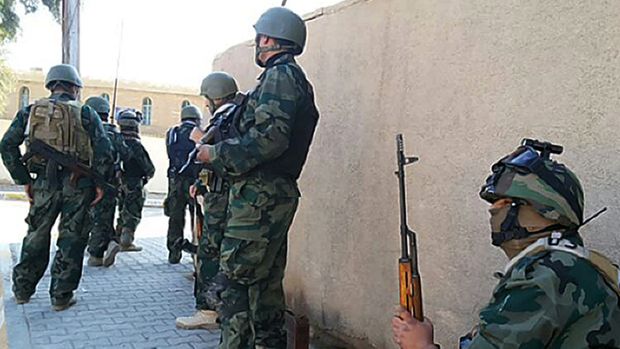
Iraqi soldiers take position in a street of the city of Ramadi, west of the capital Baghdad, on January 19, 2014 during a military operation against anti-government fighters. (AFP Photo/Azher Shallal)
London, Asharq Al-Awsat—The Iraqi army imposed a curfew on the city of Ramadi in Iraq’s Anbar province on Sunday, in tandem with the launch of an extensive security operation to expel insurgents from the city, including members of the Islamic State of Iraq and Syria (ISIS).
By Sunday evening, fierce fighting in the city had killed 20 members of the Iraqi security forces and allied tribal fighters, according to news reports.
A spokesman of the Iraqi Defense Ministry, Lt. Gen Mohammad Al-Askari, said in a statement broadcast on the pro-government Iraqiyah TV that “the Iraqi army launched an operation under air cover against members of ISIS, Al-Qaeda and other terrorists.”
The army’s provincial command issued a statement which said that the army and police “imposed a total curfew in Ramadi city areas starting at 12 noon until further notice.”
The statement added that “the operation includes a complete search of every property, company, business and workshop, and a check of all civilian IDs to weed out sleeper cells which pose greater danger than the elements that are in the area.”
Government forces were expelled from the cities of Ramadi and Fallujah at the end of December, after months of mounting political and sectarian tensions between the Shi’ite led central government in Baghdad and the largely-Sunni inhabitants of Iraq’s Anbar province.
Members of groups linked to Al-Qaeda, including ISIS, are reported to be among the insurgents who seized control of both cities.
Despite sectarian tensions, local Sunni tribes have reached accords with the central government to provide fighters to assist in regaining control of the two cities and expelling members of jihadist groups like ISIS.
A member of the Anbar Provincial Council, Adhal Al-Fahdawi, told Asharq Al-Awsat that “the situation in Ramadi has seen development in some areas where there are attacks and counter-attacks between the two sides.”
“The armed groups had the upper hand in terms of arms, ability and equipment, because they have sophisticated weapons and equipment for a long war,” he added.
Fahdawi said ISIS’s military capability was akin to “the capability of an army which has all the elements of capability and power, which is something that is not available to the tribes and the Iraqi army, who in reality lacks many of the weapons that the insurgents have.”
He added: “The residents do not want these people to remain in the area, which means their hideouts will be uncovered despite the fact that there are some tribal leaders who sympathize with them and provide them with help, including volunteers and other logistics.”
A security source, speaking on condition of anonymity, told Asharq Al-Awsat that the situation in another city in the Anbar province, Fallujah, which is currently surrounded by the Iraqi army and its tribal allies, was complicated by the presence of different factions among the insurgents.
“If we wanted to draw a map where the armed groups are present, it can be divided as follows: First, ISIS; second, Al-Qaeda; third, the traditional forces such as the Islamic Army, 1920 Revolution Brigades and others; fourth, the tribes who support these insurgents; fifth, the tribes who are against them and support the government; sixth, the impartial tribes; and finally, seventh, the Iraqi forces including the police and the supporting tribal forces,” the source said.
The security source added that there were also divisions among jihadist groups affiliated to Al-Qaeda.
“There are members of ISIS who are against Al-Qaeda on the basis of the differences between [Ayman] Al-Zawahiri and Abu Bakr Al-Baghdadi due to rejecting the unification of the two Al-Qaeda groups in Iraq and Syria, and therefore, there are strong differences between the two sides which are being settled on Iraqi territory, in a similar way to Syria,” the source said.
The tribal fighters, many of whom were part of the ‘Awakening’ movement created at the tail-end of the US occupation, and who had sided with the government, were also divided into different factions, added the source.
“The tribes in the western region are not all with ISIS and not all with the Iraqi government. There are tribes who are against ISIS and against Maliki at the same time, and they are a majority who call themselves ‘the tribes’ revolutionaries,’” he said.
“The Awakening members come in two types: the old . . . [Awakening members] led by Ahmad Abu Rishah, who fight alongside Maliki with an American green light in the hope that they will have the final say in Anbar when the battle is over, and the new Awakening members, led by Hamid Al-Hayis and Wessam Al-Hardan, who want to prove to Maliki that they, and not Abu Rishah, will cleanse . . . [Anbar] of ISIS and Al-Qaeda, and all other takfirist organizations,” he concluded.
